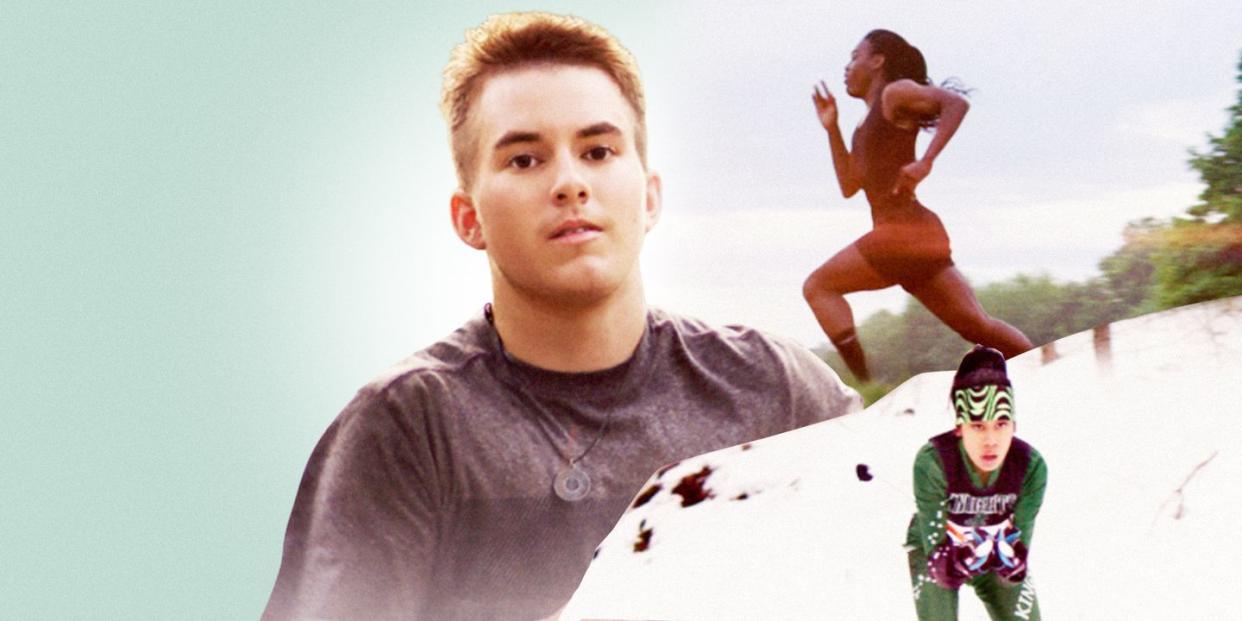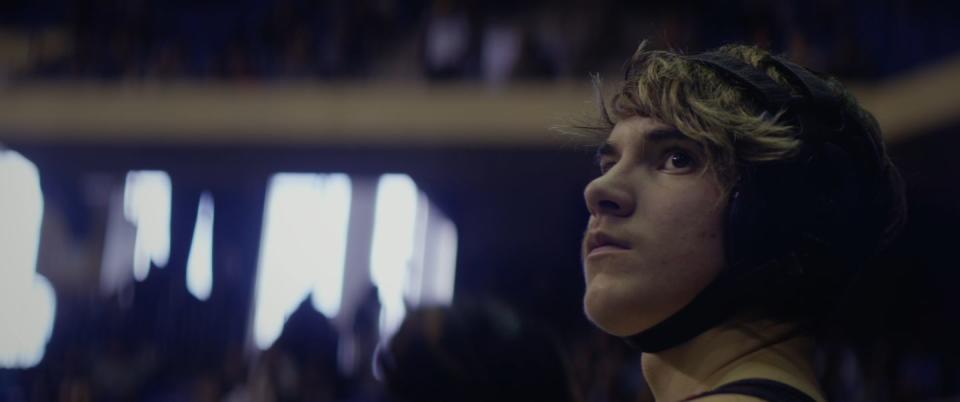How Mack Beggs and Alex Schmider Gave Transgender Athletes Their Stories Back

- Oops!Something went wrong.Please try again later.
- Oops!Something went wrong.Please try again later.
Mack Beggs is a pretty impressive person, sure. State champion wrestler. Advocate for transgender athletes. Star subject of a Hulu documentary! But even he knows that his grandma Nancy is the ultimate, no-holds-barred, could-definitely-beat-you-in-a-fight badass. In said Hulu documentary, Changing the Game—which profiles three transgender athletes, including Mack—grandma Nancy steals the show, backing up Beggs whenever and wherever, even going on Rocky runs with him as he tries to cut weight before a match.
"She doesn't play, bro," Beggs quips. "I lost so much weight that week. It was getting down to either districts or regionals, and she was like, 'I'll go with you.' I was like, 'No, you're not.' And, she's like, 'No, I am.'"
In 2019, Changing the Game—which just debuted on Hulu this month—introduced the world to Beggs and his unfuckwittable grandma. The documentary tells the story of Beggs, who, in 2017, was denied by Texas athletics rules the right to compete with men. Beggs, who is a transgender man, ended up winning the 2017 and 2018 Texas girl's 110-pound championship. Beggs's accolades not only inspired boos from the crowds who watched him become a champion, but criticism from those who felt that his wins weren't legitimate. Plus? A spotlight he never wanted.
Changing the Game follows two more transgender athletes: skier Sarah Rose Huckman and sprinter Andraya Yearwood through the course of their respective seasons. According to producer Alex Schmider, who is the associate director of transgender representation at GLAAD, the goal of Changing the Game was "to give these stories back to the people they always belonged to." The result is an awe-inspiring look at why we play sports, competing even when others so desperately want you not to—and the hatred transgender athletes face in damn near each and every event they play in.
Now, with Changing the Game's Hulu debut, we talked to Beggs and Schmider about grandma Nancy, mental health in today's athletes, and Florida's recent bill banning transgender women from participating in women's school sports.
ESQUIRE: Before we get started—Mack, your grandma is a badass.
Mack Beggs: She doesn't play, bro.
ESQ: Not to put you on the spot, but what is the best lesson she's ever taught you?
MB: Probably to just be myself, love unconditionally, and be selfless in anything that I do for anybody or for myself.
ESQ: You rarely see a more beautiful moment in a documentary than when she started running with you at the end.
MB: It was crazy, bro, because that was the first time she's ever done that for me. Actually, it was the first time she was off from work. She usually relaxes and everything, but I was really struggling that day with my weight. It was probably the hardest cut that I had to do. I lost so much weight that week. It was getting down to either districts or regionals, and she was like, "I'll go with you." I was like, "No, you're not." And, she's like, "No, I am."
Alex Schmider: Not only do we all want to be the grandma Nancy in someone's life, but we all want to have that person who just believes in you, supports you, loves you. I know a lot of people laugh because it is fun. You're like, "Oh, grandma. You're not really going to run." But it's so profound in what she says that, "You may get there before I do, but I'm going to come on the journey with you." We all need a grandma Nancy.
ESQ: We'd all be lost without our version of that person.
MB: Yeah. Everybody calls me her mini-me.

ESQ: Alex, you must have shopped this film around 2017-ish, right?
AS: 2017, 2018.
ESQ: And then, this comes out at Tribeca in 2019. And now, Hulu in 2021, which I feel must be long enough for you to have somehow maybe measure the impact of what you've made here.
MB: It's been so impactful.
AS: It's never been more relevant. We screened in small towns, in big cities, with young people, older people of all demographics, and the overwhelming majority of people who watch the film—an hour and 30 minutes—their hearts and minds are transformed. We've had people come up to us at screenings saying, "I was against this, and I've watched the film, and I'm re-interrogating and rethinking." There are people who have never met a trans person in their life, and suddenly they know Mack. They know Sarah, they know Andraya and Terry because their full lives are revealed. It's not just about them playing sports… We've screened the film for legislators before they're passing bills or voting on them. And there's an immediate return to the idea that these are people that they're legislating to exclude from life-saving outlets like sports. The impact has already been immense.
MB: Yeah. It's transforming. Everything that it does. It talks about the main necessities a basic human being needs and what we need as individuals. Which is love, acceptance, caring, and getting these life lessons out of an institution, like sports is. It establishes a tone for the rest of your life.
ESQ: You're right. The tone the documentary establishes right off the bat—it doesn't really start in sports. It starts with a love story.
AS: That is the theme that runs through. Love and support. That courses through the veins of this film, because I think that's a universal theme. That's something all of us want and need, regardless of gender identity, regardless of the different experiences that we're having. Especially, right now, we are seeking, and wanting, and needing connection… It is a love story. And where director Michael Barnett came to this film, is that someone very close, near and dear to him, had a young person who was about to start her transition. That led him to Mack’s story because he just started researching everything and he couldn't shake the story of Mack. And, that's what led to the thinking of, is there a film here? Should we tell this story? Ultimately, it's for that family. How do you show up? How do you show your love?
MB: Michael was able to strip the fact that there's something more here than just a guy and his football. This is something more genuine than that. There's something more genuine than just winning medals at the end of the day, than just being publicized for just wins.

ESQ: That's the thing I wanted to ask you. That's been the sports story of the week with what we saw with Naomi Osaka, is trusting the media. Mack, I'm sure you know full well how brutal interviews and press can be. What did you make of what we saw this weekend with Naomi and the French Open?
MB: I think it gets hard. It gets really hard. You're exposed to people exploiting you and I think it is rude, first of all. In my case, I was exposed, and then my story was twisted, and then I wasn't even being accomplished for the things that I have done. The hard work that I put in for hours. Six to eight hours a day of training, every single day. Most people in high school would just be going out to parties, or doing simple things in order to establish their profession. I was accomplished on something deeper than that. Something more fulfilling. And, I had to give up myself in that sense. I felt like that was just completely distraught, and it put me in the stress of like, Why am I even doing this? I think it's important when we're talking about mental health, and the fact that if you're taking these kids and you're exposing them for just the bare story of what you're wanting to proclaim them as. Why are we doing that, when you know it will only detriment them further on in life?
AS: A lot of times there are media stories that are only going to sensationalize or twist words, or make a story out of a non-story. Working at GLAAD, I interact with a lot of different filmmakers who were seeking to tell stories about transgender people, and they have a wide spectrum of intentions about why they want to do that. But, immediately upon meeting Claire and Michael, the intent was always to give these stories back to the people they always belonged to. I think that trust is essential. No one owes anyone their stories, speaking more to the Naomi Osaka, and what happened this week. It is a sacred gift for people to let others into their world, into their minds, into their thinking, into their heart and feelings. And so, with Changing the Game, we honored that responsibility that Mack, Andraya, Sarah, and Terry, trusted in us to do them justice in the stories that we were telling of and with them.
ESQ: The last big thing I wanted to ask about is, obviously, the documentary is unfortunately still timely in a sad respect, too. We just saw the Florida governor sign the bill banning transgender women from participating in women's school sports. Four years after you've filmed this documentary, what is it going to take for these discriminatory bills to stop seeing the light of day?
AS: It's going to take people actually getting to know the people who these policies are impacting. So often we're tied up in rhetoric, politicized sayings, and talking about legislation without actually looking at who these policies affect—and how their lives are impacted.
MB: And it goes deeper than just attacking transgender athletes. It goes deeper into attacking women in sports in general. Everyone brings up the fact that we need to have this conversation of multiple things happening that are going to be affected and who is going to be affected. The lawmakers are just covering that up with saying, Oh, we are protecting women. I know more than half the feminists that have heard about this fight, at least from my perspective. And, what they've told me is that, Oh, so you're saying I don't have the capability of beating a man? That's almost demonizing in a way to attack women.
AS: What it's going to take to really combat this legislation is coalition building of communities understanding that these attacks on trans youth and trans people are not just implicating and impacting us. They're rooted in racist and sexist notions about who gets to be a girl and who gets to be a woman, and who gets to be a boy, and who gets to be a man. Not only that, who gets to succeed. When we look at someone like Michael Phelps, he is celebrated for the fact that his body produces less lactic acid. He is an amazing athlete because of his physiological uniqueness. But at the same time, we see someone like Simone Biles get her body policed and scrutinized and the benchmark for success gets moved… I think the more people we can bring into this fight and the more inclusion we can create, the better sports are actually going to become because athletes will be able to be their best selves and athletes first.
MB: I think it has already started with that trend. I've noticed with these upcoming athletes, the amount of hard work they put in, the accomplishments that they're making, and not just in the sports, but overall all athletes. I think that's extremely important with this next generation coming up, with all these stories that they're hearing about, is developing them to be better as a person.

Join Esquire Select
You Might Also Like

